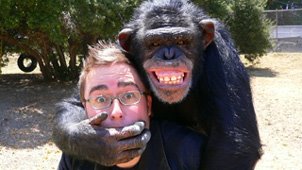 Check this out. The host, Danny Wallace is a loudmouth and does this partly tongue-in-cheek, but he is discussing a very interesting point: Chimpanzees are not human, but are they people? This is something the BBC is pretty good at: the follow-up of the programme broadcast yesterday is on the web, and you can see the main points and give your opinions. I saw just a part of this yesterday (because CSI was too engaging...), but it featured some interesting experiments with chimpanzees in captivity, and ground-breaking research among wild populations. The "usual suspects" were at play, the labs in St Andrews and Max Planck Leipzig are the main hubs for comparative studies in cognition.
Check this out. The host, Danny Wallace is a loudmouth and does this partly tongue-in-cheek, but he is discussing a very interesting point: Chimpanzees are not human, but are they people? This is something the BBC is pretty good at: the follow-up of the programme broadcast yesterday is on the web, and you can see the main points and give your opinions. I saw just a part of this yesterday (because CSI was too engaging...), but it featured some interesting experiments with chimpanzees in captivity, and ground-breaking research among wild populations. The "usual suspects" were at play, the labs in St Andrews and Max Planck Leipzig are the main hubs for comparative studies in cognition.
The most interesting parts to me were the experiments on cooperation and culture. I'm not really impressed by the fact that we share a lot of our genes with chimps, as we also share a lot of them with tapeworms and algae. Brain size and physiological comparisons are somewhat trivial, and I'm not too impressed by the stuff done on language learning (with Kanzi or other human-reared animals for instance, reported at length in the show). But what gets me is the capacity for culture, and the complexity of mind required for collaborating and sharing goals, organisation and goal-oriented planning.
As was discussed in the programme, humans wouldn't really be people without the social relations to others, without society and culture. A bunch of tissues becomes a person largely due to the upbringing and learning by other humans. The complexity of human society, its achievements (in good and bad) are the result of generations of humans having been able to cooperate and learn. Language was the key to this process, as information needs to be transmitted from indivudual to another to share responsibilities in a task, and from a generation to another, to give the offspring a better start to life, but language is still only a tool; the interesting bit is how that tool is used.
This is the hotspot of research at the moment - animal culture and collaboration. Only a while ago, it was suggested that animals didn't possess a theory of mind, the understanding that you have thoughts and beliefs, and so do others around you. Now new research suggests that this isn't the case, and most of the subsequent demarcations are falling down as well, as more and more sophisticated experiments are pursued. Cultural learning has been demonstrated, as well. There are issues with these experiments, and the debate is hot about what they actually prove, but in my opinion we are clearly moving towards accepting the idea that in terms of cognition, the difference between humans and apes is more like the difference in degree, not so much a difference in kind.
(Pic: BBC)
Wednesday, October 11, 2006
Chimps are people too
Subscribe to:
Post Comments (Atom)

No comments:
Post a Comment